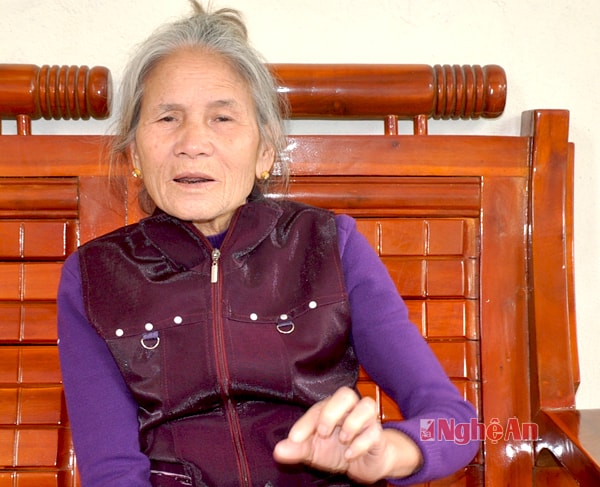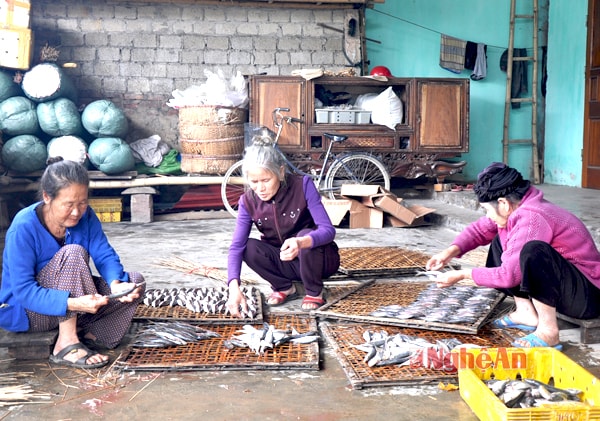Nghe An militia woman shot down enemy planes twice
(Baonghean) - At the age of 20, the female student from a coastal village was awarded the Third Class Military Exploit Medal and was admitted to the Party's ranks thanks to her achievements in shooting down enemy planes twice with her militia unit. That militia girl is now quietly looking for the green color of the sea...
 |
| Mrs. Tran Thi Binh recounts the story of shooting down a plane 50 years ago. |
Mrs. Tran Thi Binh lives alone in a small house in the middle of Thanh Vinh hamlet, Nghi Quang commune, in front of the house is the gentle Cam River, behind is the endless green of the hills. With a small body, gray hair, Mrs. Binh once carried food and ammunition to supply the army unit on combat duty and directly participated in shooting down enemy planes.
The female student shot down the enemy plane.
On August 5, 1964, after deliberately creating the so-called “Gulf of Tonkin Incident”, the US imperialists began to use the air force to escalate the destruction of the North of our country, causing many scenes of devastation and destruction. At that time, the girl Tran Thi Binh and her friends of the same age who were students were forced to move their classrooms underground. Nghi Quang land is located in the lower reaches of the Cam River, in front of the sea, behind are high mountains along with locations such as: Cam Bridge, Ben Thuy Bridge, Vinh town, Truong Bon (Do Luong) became the bomb bag of the US imperialist air force.
The level of fierceness increased when Hill 200 and Hill 170 were chosen to set up anti-aircraft artillery and anti-aircraft artillery positions to intercept enemy aircraft from the 7th Fleet attacking the mainland. Then enemy warships approached the coast and shelled day and night, turning Nghi Quang fishing village into a battlefield.
Sharing the fire with the main force, Nghi Quang commune established a combat militia platoon with 25 comrades, of which 6 were women, equipped with 3 12.7mm guns and a machine gun.
As a student, Tran Thi Binh went to school every day but still registered to join the Militia Platoon on duty, ready to carry out tasks when mobilized. 50 years have passed but Mrs. Binh will never forget March 31, 1965, the day when the army and people of Nghi Quang wrote a major event in the confrontation with the American invaders.
The enemy attacked Hill 200 day and night, they continuously bombed and fired artillery at the top and sides of the hill, the militia force steadfastly held on, transported ammunition and food supplies to the main force. As soon as the ammunition was transferred to the battlefield, a group of dozens of enemy planes rushed in to bomb, Tran Thi Binh immediately approached the position of the 12.7mm gun and fired into the sky. An F-4 suddenly tilted its wings and turned toward the sea for a while, then caught fire and fell into the sea.
Nghi Quang militia immediately coordinated with the militia of Nghi Tien and Nghi Thiet communes to capture two enemy paratroopers. That day, Nghi Quang commune militia platoon coordinated with artillery troops to achieve that feat, and the platoon was commended.
Less than a month later, on April 19, 1965, Tran Thi Binh's combat squad continued to shoot down an A-4 aircraft, completing the mission of protecting the transport fleet receiving food and was awarded the Second Class Military Exploit Medal. Later, Tran Thi Binh was awarded the Third Class Military Exploit Medal and joined the Party when she turned 20 years old.
Quietly finding the green at the sea gate
Nghi Quang residents say that wherever there was a “hot spot” in the past, there were footprints of Tran Thi Binh. July 9, 1968 was a day of sorrow and mourning in this coastal village. The enemy bombed and shelled day and night, killing 8 artillery soldiers, killing 128 civilians and injuring 170. Some families had their bunkers hit by bombs, leaving no one alive. Their cries echoed throughout the village. Tran Thi Binh and her fellow militiamen went to each collapsed bunker to rescue those trapped, bury those who died from pressure and bomb fragments, and encourage and share the pain with families whose loved ones died.
Not only in Nghi Quang area, that young girl was also present in Nghi Yen participating in combat duty, treating the wounded at Cau Cam battlefield. Then hearing the news that the enemy had dropped napalm bombs on Nghi Xa commune, killing and injuring dozens of people, Tran Thi Binh immediately appeared to help, along with the militia and people of the neighboring commune to treat the wounded, bury those killed by American bombs...
While participating in the Commune Militia Platoon, Tran Thi Binh was promoted to become a policy officer of Nghi Loc District Military Command. With her enthusiastic and proactive nature, not afraid of difficulties, hardships and dangers, this soldier continued to be present at the "hot spots" of war to deal with the consequences of bombs and rescue the wounded and casualties.
During those years of bombs and bullets, Tran Thi Binh married a fellow villager, an Air Defense - Air Force officer who was fighting far away. After the war ended, her husband was still far away, so Mrs. Binh had to ask for demobilization to return to raise and take care of her old mother and young children, fulfilling the role of a good daughter-in-law, a virtuous wife and a good mother. A Binh who had braved the rain of bombs and bullets now worked hard in the rice fields, corn fields, riverbanks and estuaries to earn a living and wait for her husband to return.
 |
| Ms. Tran Thi Binh (middle) works to increase her income at a seafood processing facility. |
Her husband passed away not long after returning home due to a serious illness, leaving Mrs. Binh with three children who had not yet grown up, and she had to struggle to be both a mother and a father. Despite the burden of making a living to raise her children, Mrs. Binh still actively participated in social work as a member of the Party Committee of the commune, a cadre of the Women's Union, and for many years as Vice President of the Veterans' Association of the commune. She was the one who encouraged members to plant trees and restore green to hills 200 and 170, soothing the wounds caused by bombs and bullets of war. She also encouraged members to help each other develop the economy, support each other in times of difficulty and adversity. Whenever they encountered difficulties, obstacles or sadness, the people of Nghi Quang fishing village often came to Mrs. Binh to share and comfort.
Now, at 70 years old, nearly 50 years in the Party, with her children gone, Ms. Tran Thi Binh lives alone in a small house. Her source of income to cover her daily life comes from working for hire, she happily accepts any job that anyone hires her to do, as long as she gets honest money. Her main job is grilling fish for a fish processing facility near her house, which she believes is suitable for her health and the income is not too bad. Ms. Binh shared: "I still have the strength, I have to work to make a living, I shouldn't bother my children too much."
Leaving Nghi Quang with the majestic hills 200 and 170 and the gentle Cam River, the image of the small but brave, resilient and forgiving woman still lingers in my mind. She is the flower that quietly spreads its fragrance in the midst of everyday life...
Cong Khang
| RELATED NEWS |
|---|
